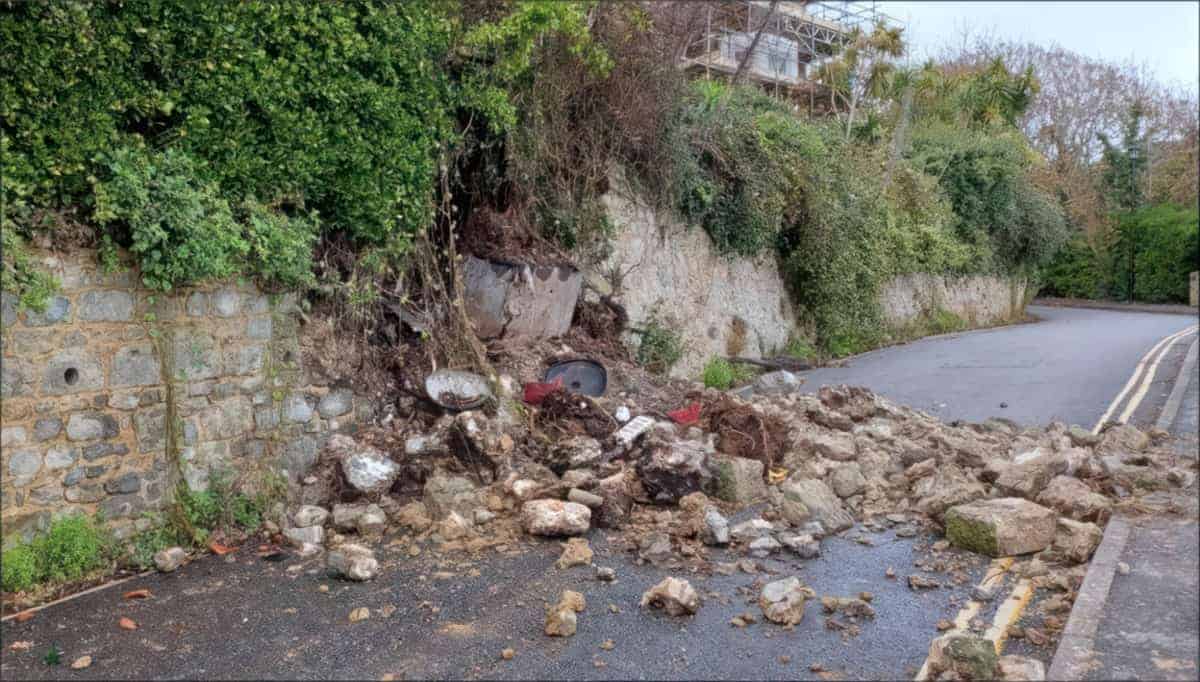Island Roads and the IWC jointly respond to Maggie Nelmes’ recent letter which called for better monitoring and public awareness of landslides and rockfalls. Ed
Everyone at Island Roads and the Isle of Wight Council understands the concerns of residents and businesses in Ventnor regarding the recent and ongoing issues affecting access in and around the town. We appreciate the points raised by your correspondent, Maggie Nelmes, and would like to share some key information with the local community to enhance understanding of this important issue.
The water-filled barriers
The red and white water-filled barriers at Belgrave Road were installed not to contain rock falls, but to prevent higher vehicles from driving too close to and striking the overhanging rock.
The council is currently recruiting a Landslip and Coastal Erosion Coordinator. Once appointed, this individual will liaise with private landowners whose properties have geological features bordering the highway to monitor maintenance regimes.
Private walls pose a risk if not properly managed
There are many private walls and areas of land around Ventnor that could pose a risk if not properly managed.
We urge all private owners to take necessary actions, and we are happy to provide advice to landowners in this regard.
Bath Road
The wall on Bath Road is an example of a private wall not covered by the Island Roads contract. The council is managing the legal process as the landowner has disputed responsibility for the wall.
We believe that simply removing the damaged section could compromise the safety of the remaining structure.
The largest inhabited landslip area
Ventnor Undercliff is known to be the largest inhabited landslip area in northern Europe. Movement has occurred historically and will continue to occur. Due to the size of this risk, the PFI contract includes financial caps on the risk of geological failure, as it would not have been affordable to contract this risk to Island Roads or any other bidder.
The cost of significant landslips and geological movements is now largely borne by the Isle of Wight council, and Island Roads must work within the council’s financial constraints when undertaking work outside of its contracted responsibilities. This is a particularly challenging time for the local authority which must balance its spending on highways issues with other priorities.
Dedicated to addressing these issues effectively
However, Island Roads and Isle of Wight council are dedicated to addressing these issues effectively through close collaboration. By working together, we can ensure that the necessary steps are taken to manage and mitigate the impact of these landslips.
A recent example is Gills Cliff Road, where the IWC and Island Roads partnered to design and approve a major safety scheme, allowing the road to be re-opened.
Leeson Road partnership
Our partnership was also crucial in the reopening of Leeson Road following the catastrophic landslide, one of the largest recorded on the Island in 100 years.
Just recently, OnTheWight reported on the council’s plans to invest £600,000 in essential works at Leeson Road. These efforts focus on data collection and evaluation, ground movement surveys, permanent signage, and associated works, demonstrating our commitment to the upkeep and improvement of local infrastructure for the safety and benefit of our residents.
Public safety remains our top priority
Public safety remains our top priority, and we believe that by working together, we can enhance our monitoring efforts at various locations along the Undercliff and at Leeson Road.
We appreciate the understanding and cooperation of our residents as we navigate these challenges together. Your support is invaluable as we strive to maintain and improve the safety and accessibility of our community.





